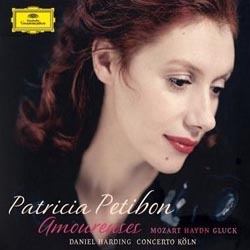 |
||||||
 |
||||||
Album Title: Amoureuses (Mozart, Haydn, Gluck) Performers: Patricia Petibon, Daniel Harding / Concerto Köln Label and #: Deutsche Grammophon, DG477 7468 Running time: 68'39" Recorded: January 2008 She's French, she's pretty, she sings beautifully and she's in love. I am writing about Patricia Petibon and her first recital disc with Deutsche Grammophon where she's chosen to portray a whole gamut of emotions through twelve complex and very different women in love - and sometimes in rage. In their operas, Mozart, Gluck and Haydn have given sopranos amongst the most emotionally involved arias ever composed for a human voice and the most famous of those are obligatory stops for any young soprano aspiring to global fame. |
||||||
 |
||||||
| On this first recital, Patricia Petibon has given herself a challenge that goes far beyond pure technical merits and nice singing. The range of emotions from despair to rage, passion to hatred, joy to drama is a testimony to her theatrical abilities as much as to her tremendous talent as a soprano. Take for example two of Mozart's most famous female characters, the Queen of the Night from the Magic Flute and Susana from the Marriage of Figaro. They could not be further apart. The first one is cold and wrapped in self-pity and anger, the other pure, almost angelic. Petibon succeeds at both, a rare feat. Patricia Petibon, born in 1970, is still at the onset of her global career yet already has accumulated accolades, prizes and standing ovations, first as Rachel Yakar's student, then with William Christie and more recently Nikolaus Harnoncourt who have deeply influenced her interpretation of Gluck and Haydn for the first and Mozart for the second. Yet there is no question that she's an artist not only in full command of her voice but also her artistic direction. Her ornaments are truly unique. Her choice of arias from five rare Haydn operas rather than the well traveled arias typically found on soprano recitals is a testimony to her independence and also a great opportunity to discover a face of Papa Haydn that is mostly unknown. Did you for example know that Haydn composed a 'buffo' aria (a comic air) in the apothecary? I did not but he certainly gives Rossini's best comic parts a run for their money. With a French soprano singing classical and baroque operas, your mind probably already jumped to the conclusion that a new Nathalie Dessay is emerging. Alas, you could not be further from the truth. Their nationality and tessitura are where any comparison should stop. To Dessay's crystalline coldness and very controlled delivery, Petibon opposes with a much warmer and deeper tone (although her high notes are as clear and pure as one might desire, just a little more forced than Dessay's) and a tremendous generosity. Petibon's passionate lovers are sensual, alive and fiery as opposed to the 'princess of ice' Dessay portrays on and off the stage. |
||||||
| Mozart's ever-so-famous "Aria of the Queen of the Night" by Mozart is probably the only one where I could have preferred a little more rage and sharpness instead of the warm and rich tone of Patricia Petibon but in Gluck and Haydn, she is simply magnificent. I have always had a weakness for Gluck's fiery female characters. From Armide to Iphigenie, from Orfeo to Euridice (typically both sung by female singers although Orfeo is a male), those classic dramas require full abandon from the performers. Any restraint in the furor kills the pathos. Petibon has been at a very good school with William Christie. Her heroines scream, rage and pound without reserve but turn just as consummately seductive and alluring the next instant. I actually would be at a loss to name another soprano who has mastered such a broad range of characters with this level of personification and abandon to the role. |
||||||
 |
||||||
| Concerto Köln is its usual self on this recording, tonally rich and very respectful of the singer. Daniel Harding offers Petibon beautiful support without ever intruding, just the way it should be on a recital. As is expected with Deutsche Grammophon, the recording is dynamically compressed ever so slightly and bright. As a result, Petibon's highest notes can at time turn somewhat glassy, something I definitely did not experience the two times I went and listened to her in a concert. Therefore it is a likely artifact of the recording process. SACD would have been a better medium for her pure voice but as far as DG CDs go, this is still one of the technically better ones. It's just not quite as good as the very best audiophile CD labels put out. Let's only hope that Petibon's absolute dedication to her art and passion won't burn her voice prematurely as happened to Rolando Villazon. Today the young tenor is merely a shadow of the talent he displayed seven years ago (although his latest discs and concerts seem to indicate the beginning of a recovery). Such a risk always exists for singers who dedicate themselves body and soul to their art. Patricia Petibon will be one of the sopranos who'll explode over the next decade. She's there already technically and artistically. All you need to do now is discover her. This disc is a perfect window on her talent and a perfect introduction to certain baroque and classic operas should these genres still be foreign to you. And did I mention that she is pretty too? |
||||||
 |
||||||